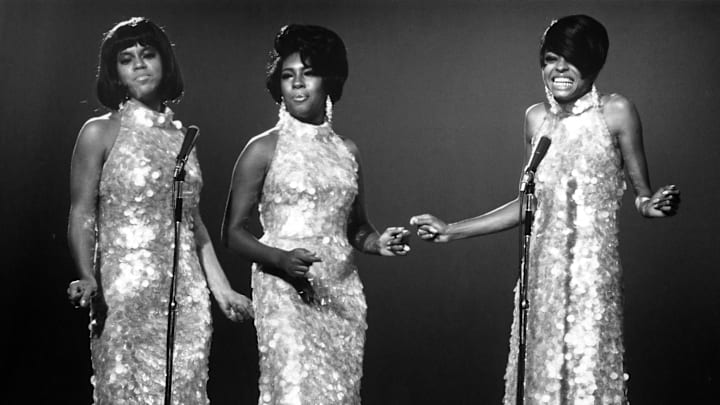Motown is one of the most celebrated and trailblazing labels in American music. During the 1960s, it dominated the Billboard Hot 100 and R&B charts, introducing soul music to audiences of all ages, ethnicities, and backgrounds.
Acts such as the Temptations, Supremes, Four Tops, Smokey Robinson and the Miracles, Marvin Gaye, Stevie Wonder, and the Jackson 5 became household names.
Girl groups had a profound influence on Motown's success. Diana Ross became one of the most recognizable celebrities of her era. The Supremes story even inspired the hit musical, Dreamgirls. Martha and the Vandellas and the Marvelettes had just as important of an impact on the music empire's rise.
The legendary girl groups of Motown
The Marvelettes and Motown's First Number One Song
Berry Gordy founded Motown in 1959, and Smokey Robinson and the Miracles gave the label its first million selling record, "Shop Around", in 1960. It was the Marvelettes, however, that brought Motown to the top of the Billboard Hot 100 for the first time. "Please Mr. Postman", which was released in August 1961, was a smash hit. It was eventually covered by the Beatles and the Carpenters,
The Marvelettes would continue to chart in the Top 40 with songs such as "Beechwood 4-5789 (1962)" and "Too Many Fish in the Sea (1964)." In 1966, the Marvelettes entered the Top 10 again with Smokey Robinson's composition, "Don't Mess With Bill."
While there are many great Marvelettes songs, they will forever be linked to "Please Mr. Postman." Their biggest hit proved that Motown was a force to be reckoned with. The label advertised itself as the "Sound of Young America" and it became that.
How A Secretary Became One of Motown's Most Beloved Voices
In March 2024, Martha Reeves, leader singer of Martha and the Vandellas, was honored with a star on the Hollywood Walk of Fame. Nearly 30 years before, Reeves and the Vandellas were inducted into the Rock 'n' Roll Hall of Fame in 1995. Such accolades are quite extraordinary for a woman who began her Motown career as a secretary.
Reeves initially auditioned for Motown as a singer but was hired as executive Mickey Stevenson's assistant instead. Martha and her group would eventually sing backup for other acts until they were finally given a chance to make a record of their own. "I'll Have To Let Him Go" came out in 1962.
While their first song did not do well, Martha and the Vandellas would become a hit machine for the music empire with tracks such as "Come and Get These Memories (1963)", "Heatwave (1963)", "Heat Wave (1963)", "Quicksand (1963)", "Dancing in the Street (1964)", "Nowhere to Run (1965)", "Love (Makes Me Do Foolish Things) (1965)", "I'm Ready For Love (1966)", and "Jimmy Mack (1967)".
Reeves' voice was incredibly powerful and a strong foundation for some of Motown's most enduring hits.
Diana Ross and the Supremes, Motown's Gold Mine
"Baby Love (1964)", "Where Did Our Love Go (1964)", "Come See About Me (1964)", "Stop! In The Name of Love (1965)", "Back in My Arms Again (1965)", "I Hear A Symphony (1965)", "My World is Empty Without You (1965)", "You Can't Hurry Love (1966)", "You Keep Me Hangin' On (1966)", and "The Happening (1967)" are just some of the timeless hits Diana Ross and the Supremes are responsible for.
Truly Motown's princess, Ross became the corporation's biggest star. Berry Gordy made her career a personal project. They were even romantically linked and shared a child together. The Supremes not only gave Motown the most number-one hits (12), but helped the company become internationally beloved, according to Billboard.
Diana Ross was a central figure as Motown became an entertainment conglomerate. She would star in Motown-produced films, including Lady Sings the Blues (1972), Mahogany (1975), and The Wiz (1978). Not immune to controversy, Ross and her relationship with Gordy has been criticized, particularly due to Supremes original member Florence Ballard's firing and tragic death.
The Supremes were Motown's gold mine. They put the label front and center in popular culture. Ross, and her groupmates, Mary Wilson, Betty McGlown, and Florence Ballard, exuberated beauty, class, and elegance. Diana Ross, now in her eighties, still tours today and keeps the Supremes' legacy alive.
Motown Changed History
Motown was not just an entertainment company and brand. Through its music, the label brought people of all ethnicities together. Berry Gordy and Motown's roster of acts, including its legendary girl groups, made history. Music created by African-Americans topped the Billboard Hot 100 charts nearly on a weekly basis at the height of the Civil Rights Movement. This was a remarkable achievement.
Over 60 years later, Motown's music is still beloved and listened to by individuals of all ages. Gordy wanted to create music for everybody. Without a doubt, he accomplished his goal. Motown will go down as one of the most prolific musical contributions in American history, and rightfully so.
